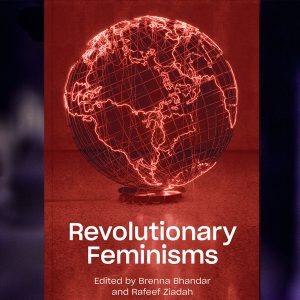Hailing a great feminist and African nationalist
As advisor to a number of African leaders during their struggles for independence, the freedom fighter and champion for women’s rights Andreé Blouin cannot be relegated to the footnotes of history.…
Author:
16 December 2020

Andreé Blouin is best known as the powerful advisor to Patrice Lumumba, but much of the focus on the activist has been on only small parts of her dedication to freedom. Her brand of African nationalism and feminism dismantled preconceived notions of race and gender on a colonised continent that often excluded women from politics – or diminished their contributions to “the wife of”. It is necessary to remove Blouin from the shadow of Lumumba, so she is fully recognised for her particular, singular political actions.
The fight begins
Blouin’s mother was a 14-year-old girl named Josephine Wouassimba from the banks of the Oubangi River. Her father, Pierre Gerbillat, was a 40-year-old Frenchman. Born in Bessou in Ubangi-Shari – now the Central African Republic – on 16 December 1921, Andrée Madeleine Gerbillat (later Blouin) became radicalised during her time in an orphanage in Brazzaville after she was ripped away from her mother at three years old. She escaped the orphanage – and potential marriage – in her teenage years.
Blouin was intolerably unhappy at the mixed-race orphanage, where nuns indoctrinated the children. In the early 20th century, it was commonplace for mixed-race children to be separated from “sinful” parents and hidden from new European arrivals in the Belgian colony – and from society in general.
“We were to be taught total resignation and submissiveness so that we would not in any way upset the precarious balance of the white man’s ship on the already rolling waters of Black discontent … Thus, the orphanage was to accomplish two purposes: while serving to perpetuate a racist society, it was also to be the proof of colonials’ humanity,” Blouin writes in her memoir.
Related article:
By virtue of being born, Blouin was a living sin. Although years passed and things changed, society’s ignorance and cruelty did not. It was no better for her two-year-old son, René, years later in Bangui, when he contracted malaria. Wracked with anxiety, Blouin’s appeals for assistance for her ailing son were reportedly denied because René was “one-quarter African” and malaria medication was only available to Europeans in 1946. “The death of my son politicised me as nothing else could,” she writes.
Written in collaboration with Jean MacKellar, Blouin’s memoir, My Country Africa: Autobiography of the Black Pasionaria, asks: “Yet who, really, I had to ask myself, was the fool? Was it, in fact, possible for a young woman to be as proud as I, in a system designed to keep non-whites on their knees?”
Blouin did not give up. Burdened with humiliating and discriminatory experiences courtesy of the colonial system, she moved deeper into politics, directed by the violent colonial experience she continued to experience beyond the orphanage.
A move into politics
Though companies in the Congo began to open their doors to women in the 1950s, most had to negotiate lives and a social status in an environment offering only bleak prospects. Not even 20 women in the country had a university degree.
Blouin briefly moved to Europe with her daughter, working to change laws dictating who could receive malaria medication in Africa. Her formal political career began in 1958 when she became involved with the Rassemblement Démocratique Africain (RDA), the first French-speaking pan-African organisation, in French Guinea, just before the referendum to decide whether to attain independence or remain a colony.
Blouin was travelling with her husband, who worked for a mine, when she met a young Sékou Touré, leader of the independence movement in the French-ruled country. (She later turned a jaundiced eye on Touré’s reprehensible actions after independence.) She organised rallies and gave lectures on independence.
She met with, lobbied for and counselled many other African leaders, including Ghana’s Kwame Nkrumah, all fighting for African liberation. She often continued counselling sessions after the nations broke out of colonialism. Guinea attained independence in October 1958.

Getting involved in the Congo
Blouin’s work led her to the Belgian Congo, where she joined one of its largest political parties, Parti Solidaire Africain (PSA), which was mobilising for the country’s independence. Antoine Gizenga, PSA’s leader, recruited Blouin in French Guinea.
After Gizenga’s party formed a coalition with Lumumba’s Movement Nationale Congolaise (MNC), the Congolese, through countless lost lives, won independence in June 1960. But Congolese women were not allowed to vote in this historic election. They only got suffrage from 1967, despite Lumumba declaring that universal voting rights should include women as early as 1960.
Aware that independent rulers are vital to the poetic ideology of democratic rule, Blouin sought out leaders the Congolese people wanted and arranged for them to sign a protocol of accord. More than anything, she wanted to stop Belgian imperialist interests from installing a puppet government after independence. She escaped the country with the signed document hidden in the roll of her chic signature hairstyle, before leaking it to the international media. This played an important role in bringing about a legitimate government in the embattled country.
Related article:
Gizenga, who in 1960 was labelled a “Marxist extremist” by The New York Times, became deputy premier and Lumumba the first prime minister of the Democratic Republic of the Congo. Blouin was appointed Lumumba’s chief of protocol. The same New York Times article says of her: “Married to a French Army officer, Mme Blouin is nevertheless a devoted advocate of extreme African nationalism.”
While the Dwight Eisenhower administration fretted about her communist links, Blouin said in response to a question about her affiliation: “Let small fools call me what they like. I am an African nationalist.”
It was a time of great mistrust and, true to pan-African ideology, Blouin recognised that there could be no real independence without robust reform to loosen Africa from the grip of its colonial parasites. A mutiny broke out in the country’s army, leading to years of terrible violence and political upheaval. Despite appeals for help, the West provided only an anaesthetic to what became known as the Congo Crisis.
In the early months of his leadership, Lumumba turned to the United States and United Nations for help with the crisis in his country. When neither were forthcoming, he asked the Soviet Union. This cemented the idea that the Congo was leaning towards communism.
Women’s rights
After independence, Blouin was an organiser for the Feminine Movement for African Solidarity, which championed Congolese women’s rights and fought for access to healthcare, citizenship and education. Through this work, she realised that the need to unchain women was as serious as unchaining Africa, leading her on a pan-African feminist campaign.
Blouin vowed to free African women from outmoded traditions that left them at the mercy of men. She believed in a woman’s ability to do anything, saying, “If she so chose, the woman could be the foremost instrument of independence.”
Related article:
Blouin, then 39, was expelled from the Congo in September 1960 by its army leader, Mobutu Sese Seko, who had come to power the week before. He had been unsuccessful in arresting Lumumba, who was under the protection of soldiers from Ghana and Guinea, resulting in Sese Seko calling for their United Nations units to be pulled out for their interference in Congolese affairs.
Blouin’s influence is said to be behind the women-led armed Kwilu rebellions against Sese Seko’s rule, led by Pierre Mulele and his wife, Léonie Abo, between 1963 and 1968. It was a deadly time for the country; more than a million people were killed.
The end of a life in struggle
Blouin’s political career and ambitions did not end when she was expelled or when Lumumba was executed in Katanga in January 1961 in a coup backed by the Belgians and given the nod by the US. She denounced neocolonial policies from a new base, evading two murder attempts, and continued as the opposition spokesperson from exile. Employing her oratory skills, she worked for the national Algerian radio and showed up at the Organisation of African Unity’s special session on the Congo in 1964, hosted by Emperor Haile Selassie.
Blouin eventually settled in Paris where she forged ahead with hopes for a new revolutionary society, housed leftist figures and often critiqued French policy in Africa. Her spirits remained aligned with the pan-Africanist vision of a decolonised continent.
Related article:
In the gallery of Congolese women revolutionaries, few names come up. But it would be an error to think they did not contribute to the struggle for independence. Honouring Blouin is just the beginning – others, such as Henriette Bamba, who fought for the women’s vote in the 1960 election, need to be fully recognised.
“I want Africa to be loved. I speak of my country, Africa, because I want her to be known. We cannot love what we do not know. Knowing comes first, the love follows. Where there is knowledge, surely there will be love,” said Blouin.
Later, Blouin lived a more quiet, unobtrusive life. Inconspicuous at 65, she died on 9 April 1986 in Paris.




